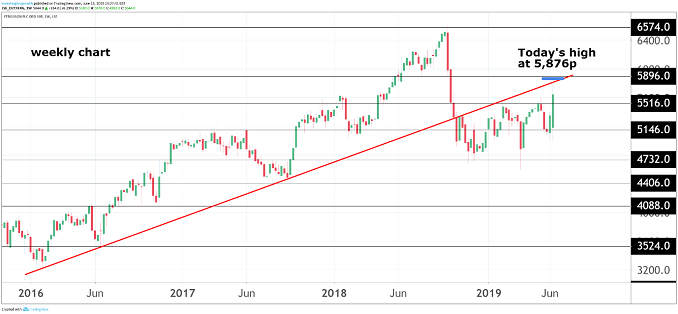Ferguson surges as activist investor piles in
Trading at a discount to US peers, this American fund manager think's he's spotted a bargain.
13th June 2019 14:19
by Graeme Evans from interactive investor
Trading at a discount to US peers, this American fund manager think's he's spotted a bargain.

London's recent bout of shareholder activism revealed another target today, with "undervalued" plumbing and heating supplies firm Ferguson (LSE:FERG) in the sights of US billionaire investor Nelson Peltz.
Shares in Ferguson, which used to be known as Wolseley, powered to the top of the FTSE 100 risers board as it emerged that Peltz's Trian Fund Management had spent £736 million on a 6% stake to become the second-biggest shareholder.
The New York-based fund, which was jointly founded by Peltz in 2005, urged Ferguson's management to work with it on initiatives to create long-term shareholder value. It said:
"Trian believes that Ferguson is an attractive business that trades at a discount to comparable U.S. peers."
The move by Trian comes in the week that Ferguson disappointed investors with third quarter sales figures that showed signs of a slowdown in American growth. The company depends on US markets for about 85% of its revenues.
Prior to this morning's initial 10% surge to 5,876p, Ferguson shares had underperformed the wider FTSE 100 index this year — a point highlighted by analysts at Jefferies in a note today.
They said that Ferguson's forward price/earnings (PE) multiple of 13x represented a discount of between 20% and 25% to its US peers, even though many of them were facing similar end markets to Ferguson.

Source: TradingView Past performance is not a guide to future performance
Despite the recent slowdown in the US, Jefferies still expects Ferguson to deliver "consistent growth ahead of peers" in the medium term, underpinned by volume outperformance and pricing power.
They have a price target of 6,127p, adding there was also room for further share buy-backs on top of the surprise $500 million announced by the company on Monday. They said the buy-back corroborated their view that Ferguson's conservative balance sheet and robust cash generation could underpin its ability to do both M&A and extra cash returns.
Trian has not revealed its strategy for Ferguson. The fund, which has $9.8 billion of assets under management, says it invests in high quality but undervalued and underperforming companies.
Its move is the latest example of US-based shareholder activism in the London market.
FirstGroup (LSE:FGP), for example, is currently the target of Coast Capital, which has used a near-10% stake in the transport group to press for the company's UK and US assets to be split. Coast has also called for the removal of several directors, including CEO Matthew Gregory and chairman Wolfhart Hauser.
Barclays was recently the subject of a campaign by activist investor Edward Bramson urging the bank to scale back investment banking operations. Bramson, whose investment vehicle has built up a 5.5% stake, was recently unsuccessful in winning a seat on the Barclays board.
Elliott Advisors was more successful at Whitbread (LSE:WTB), with the Premier Inn owner agreeing to sell its Costa coffee shops to Coca-Cola (NYSE:KO) after pressure from shareholders in 2018.
These articles are provided for information purposes only. Occasionally, an opinion about whether to buy or sell a specific investment may be provided by third parties. The content is not intended to be a personal recommendation to buy or sell any financial instrument or product, or to adopt any investment strategy as it is not provided based on an assessment of your investing knowledge and experience, your financial situation or your investment objectives. The value of your investments, and the income derived from them, may go down as well as up. You may not get back all the money that you invest. The investments referred to in this article may not be suitable for all investors, and if in doubt, an investor should seek advice from a qualified investment adviser.
Full performance can be found on the company or index summary page on the interactive investor website. Simply click on the company's or index name highlighted in the article.